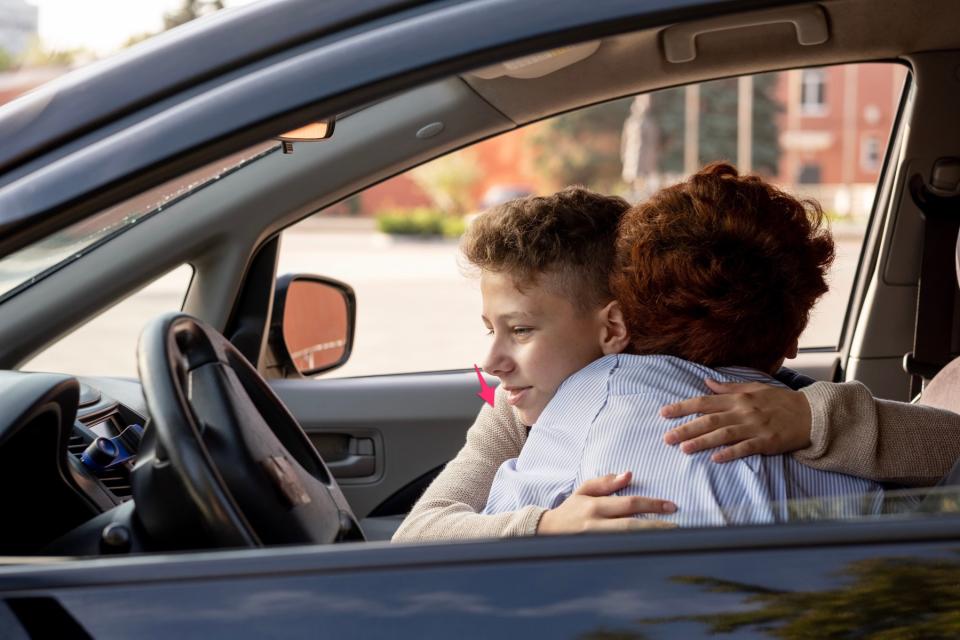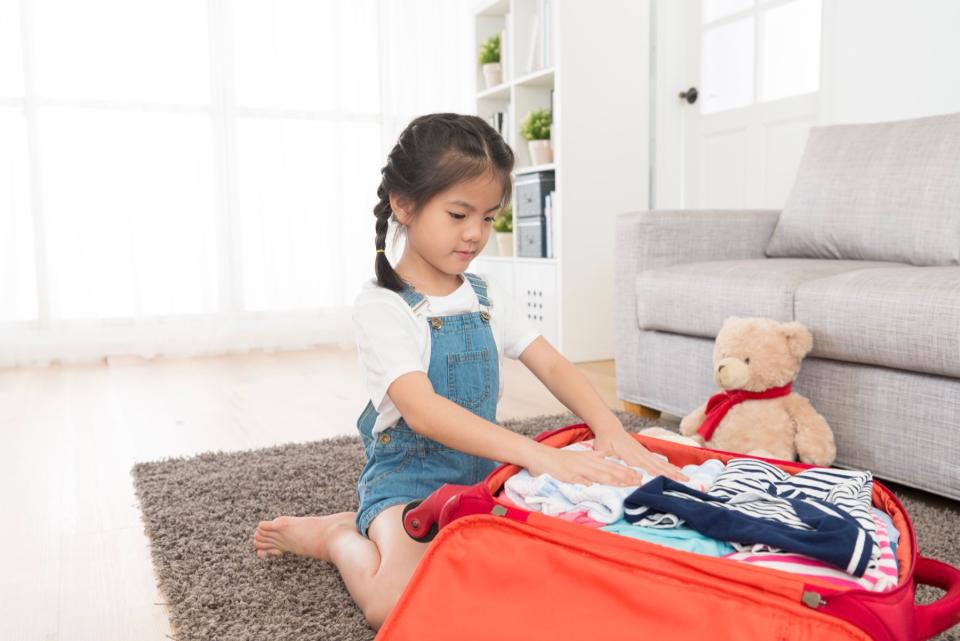Make Co-Parenting Transitions Easier—For You and Your Child
Transitions are one of the hardest parts of co-parenting—for everybody involved. My co-parent and I live far away from each other, and the transitions are harder than being separated from my son.
Prepping, repetition, and clarity make a big difference, whether you can walk to your child’s house or you live on the other side of the country. Here are 11 tips for making transitions easier.
Keep your children in the loop
We keep a visual calendar on the fridge, and we talk about when it’s going to be my son’s weekend with his dad. We talk about it every day: “This is Wednesday, then you have swim practice Thursday, then you’ll be at Dad’s for the weekend.”
For young children, you can use stickers to mark the days they’ll be with their other parent. Or you can decorate the whole calendar. If you use OurFamilyWizard, you can print your official parenting time calendar.
When my son is with his dad and we’re on the phone, I tell him, “It’s three sleeps until you come back.” Use simple terms that fit your kid’s age.

Keep the routine consistent
A routine makes the transition easier—a lot easier. Park in the same area, buy tickets in the same spot on the plane, pack the same snacks, get McDonald’s every time you pick your child up from the airport or bring a granola bar when you pick up them from school.
Children thrive on consistency and structure, and they feel safest when things turn out the way they expect. Give them concrete things to expect, and they’ll feel a lot more comfortable and less unsettled by the transition.
Choose the right spot to transition
We used to drop off my son by meeting his dad at the passenger drop-off curb. We switched to making the transition inside the airport. It’s still quick—under five minutes—but it feels less stressful because now I’m not anxious about the cars behind me. It’s more relaxed.
I suspect my son can feel my stress levels rising, and this helps us all stay cool and calm so that the transition feels normal and safe.

Prepare your child for the car ride or plane trip
If you don’t live nearby, transitions take a little extra effort, especially if your child is young or hates travel.
HuffPost crowdsourced suggestions from real parents. How do you survive long trips with kids? Our favourite answer: Involve the children and treat it like an adventure. Let them pick out some toys or activities so they feel some buy-in and ownership of the trip. (Runner-up advice: Definitely bring extra clothes.)
If you’re flying, Parents Magazine suggests booking an early flight—there’s less chance of delays. And bring a new toy or activity to surprise your child. Even if it’s small or cheap, something new is bound to be more entertaining than whatever they already have.
Speak politely with your co-parent
It might be the only time your child sees you together. Show that you’re a team, that you get along. Model a positive relationship. Keep it together and be friendly.
Children can be hyper-aware of their parents' emotions, body language, and tones of voice. Transitions are already a stressful moment, but staying calm and sounding respectful can soothe the stress.
(Make it a priority to show up on time, to give your co-parent the best shot at staying polite, too.)
Take care of yourself, too
Transitions can be tough for the children, but sometimes they’re even harder on you. Check out OurFamilyWizard’s resource, Coping Through the Emotions of Co-Parenting Drop-Offs: A Survival Guide. It lists seven reasons why drop-offs can be painful for you—along with strategies for calming each trigger.
Schedule changeovers thoughtfully
Scheduling matters in so many ways—does it work for both schedules? Is it sustainable? Is it convenient for the children? Will everyone remember? Scheduling pickups on the OurFamilyWizard Calendar keeps everyone on the same page. It’s a centralised platform for parents to follow the details of their parenting plans.

Try to minimise packing
When children are raised in two separate households, they can feel like constantly having one foot out the door. It can be hard to feel settled in one place, and packing a bag for every changeover can strengthen that feeling. Especially for schedules that include midweek overnights or more frequent changeovers. They might also stress about forgetting items in one home that belonged in the other.
If a child's first activity when they get home is unpacking, that can make them feel like a visitor. Instead, try to create an atmosphere of simply being at home as soon as they step through the door. It helps to have wardrobes, toiletries, and other familiar and daily items at both houses.
It’s also less work for you. It’s not always feasible, but every little bit helps.
Don’t say “I miss you”
Don’t say “I miss you”—whether you’re saying goodbye, video chatting, or greeting your child when they return. This puts a sense of pressure and burden on the kid, as if they’ve done something wrong that hurts you emotionally.
Instead, say “I love you” or “I’ll be thinking of you every day!” That helps your child feel connected without feeling guilty.
Transitions are tough, but they’re easier when you’re both prepared
Of course, you will miss each other. But there are lots of straightforward ways to stay in touch while your child is gone. When your child returns, you’ll both be ready for a smooth transition back to your life together.

Author's Bio:
Katharine Rupp is a Legal Liaison and Judicial Education Coordinator with OurFamilyWizard. She also works as a California-based family law attorney. Katharine has successfully combined her legal background and personal experiences with family law issues to build a career focused on helping individuals navigate an often confusing, frustrating, and complex family law legal system. She chose the field of family law because she enjoys connecting with people, resolving complicated problems, and helping people to move forward with their lives.




